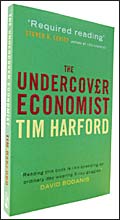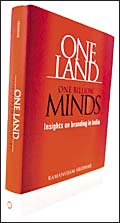 |
THE UNDERCOVER ECONOMIST
By Tim Harford
Little, Brown
Pp: 278
Price: Rs 494 |
If
a book like Tim Harford's the undercover Economist had been available
in the late 1970s in place of the many-not all-dry tomes on economics
that I had to labour through for an undergrad course, then perhaps
I would have chosen to study that subject a little more assiduously
in college than I did. Of late, more economists have been writing
pop books on the subject than ever before. And quite in keeping
with another book that scorched up the sales chart, Freakonomics
(by Steven D. Levitt and Stephen J. Dubner), The Undercover Economist
offers simple insights into how almost everything in the economy
works.
Harford, who writes a couple of columns (one
of them is eponymous with the title of his book) and economics
editorials for the Financial Times, uses Ricardo's Theory of Rents
as the starting point to demonstrate how the 19th century thinker's
work on farmland and rents can be the basis to explain everything-from
why a Starbucks (or a Barista) can charge a customer a hefty premium
for his cappuccino to why multiplexes in malls can price popcorn
at near-extortionate rates, which movie-goers are happy to pay.
Unlike Freakonomics, which dealt with subjects
like drug peddlers, sumo wrestlers and others on the periphery
of the economy, Harford focuses on more mainstream issues-the
power of scarcity, pricing and protectionism, trade and tariffs-using
everyday examples like the price of a cup of coffee or a poker
game or traffic congestion. Some readers may find some of Harford's
ideas too simplistic; yet others may be turned off by his views
on sweatshops in China or elsewhere-Harford makes a case that
they benefit all the stakeholders-or on how self-serving dictators
in African countries like Cameroon actually foster economic development.
Still, Harford is able to shape mundane examples into an excellent
and breezy read without talking down to his audience or taking
refuge behind jargon or complex theories.
The Undercover Economist is a book you must
pick up if you want a fresh perspective on how basic ideas in
economics can help in answering the most complex and perplexing
questions about the world around us. The only downside of the
book: it could be a bit too basic for more seasoned readers of
economics. But then, it won't be wrong to believe that there are
far fewer of those than lay readers, thus assuring that, in this
case, Harford's book enjoys the power of scarcity that the only
coffee bar at a subway station does during rush hour. At least
till the next pop economics book comes along.
 |
ONE LAND, ONE BILLION
MINDS
By Ramanujam Sridhar
Productivity & Quality Publishing
Pp: 400
Price: Rs 850 |
For a book with an
imposing title, One Land is surprisingly breezy. There are no
heavy-duty advertising or marketing (A&M) theories, no it-changed-the-world
case studies, or even breathless descriptions of the writer's
own successful A&M campaigns. Instead, Sridhar, who now runs
a Bangalore-based branding and communications company called brand-comm,
packs the book with everyday experiences and insights drawn from
his 23-year-long stint in the industry. Like the man himself,
the book is chatty, ingenuous and humorous, never making the mistake
of taking itself too seriously. Reading One Land, it becomes evident
that Sridhar never meant it to be an academic work, but an elaborate
diary that would just talk to its readers. Possibly because of
that, Sridhar does get carried away once in a while. For example,
his opening chapter on branding asks the reader if she remembers
the Tamil film Thiruvilayadal. Excuse me? Obviously, Sridhar forgets
that he's writing for a national audience. Overlook such minor
quirks, and One Land offers something for every A&M professional.
|





